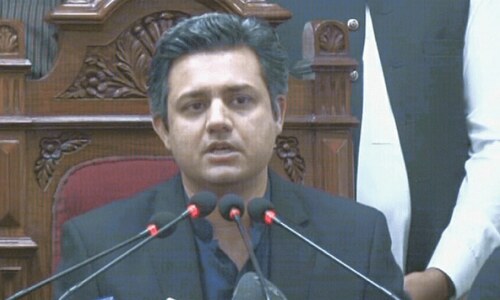ISLAMABAD: The chairperson of the Sustainable Development Goals (SDGs) Task Force, Maryam Aurangzeb, said on Wednesday that one of the key challenges to achieving the SDGs was access to reliable and authentic data, and proposed involving elected representatives from across the country as a counterstrategy to fill this gap.
“Social sector programmes are being executed by government and non-government organisations, but the services of parliamentarians have never been utilised,” she said.
Ms Aurangzeb, a PML-N MNA, was speaking at the launch of the second phase of the Pakistan Country Programme Strategy 2016-21, organised by the international NGO Wateraid.
The event coincided with the completion of ten years of Wateraid’s presence in Pakistan.
During her speech, Ms Aurangzeb highlighted the importance of involving parliamentarians in implementing social sector programmes. “One MNA has a following of around 150,000 persons, and they have more knowledge of the local situation as compared to a complete reliance on government functionaries,” she said, citing an example of a high refusal rate for the polio vaccine in the Kohat region.
“We asked Shehryar Afridi to extend his support in the next campaign, which resulted in an 83pc improvement, as compared to the previous campaign.
“Similarly, children dying of diarrhoea who do not have access to safe drinking water and open defecation are troubling news that should not just be kept in files, but we all must face to eradicate these issues,” she said.
She said seven SDG secretariats have been set up – one at the federal level, four in the provinces, and one each in Gilgit-Baltistan and Azad Kashmir – to counter the lack of data.
“This will not only include the governments, NGOs and elected representatives at one forum, but will also help develop coordination at the national level to meet the SDGs,” Ms Aurangzeb said.
Experts who spoke at the launch highlighted Pakistan’s position as one of the world’s 36 most water-stressed countries, and its place among the top 10 countries with the greatest number of people without access to safe water – 16 million Pakistanis have no choice but to collect unsafe water.
Wateraid UK chief executive Barbara Frost highlighted the importance of water, sanitation and hygiene (WASH), saying the lack of nutrition among children is directly related to WASH, as children suffering from diarrhoea also face malnutrition.
Meanwhile, Wateraid’s country representative Siddique Khan said two out of every five schools lacks toilets, and said two million people have benefited in the sanitation sector and one million with regards to access to water due to various projects initiated by Wateraid over the last decade.
Discussing Wateraid’s achievements, a sixth grader from Tharparkar, Shailander Kumar, said the rate of sickness in his school fill from 30 students a day to five students a day after their hygiene programme was adopted.
Published in Dawn, September 30th, 2016












































Dear visitor, the comments section is undergoing an overhaul and will return soon.